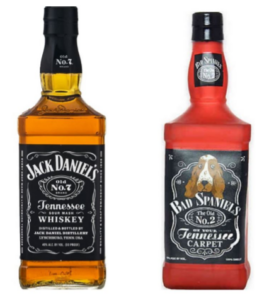Clinic Files Amicus Brief on Behalf of Authors and Creators in “Bad Spaniels” TM Case
Cyberlaw Clinic » Blog 2023-02-27

On February 23, 2023, the Cyberlaw Clinic filed an amicus brief on behalf of Authors Alliance and ComicMix in the Supreme Court of the United States, in support of VIP Products, which seeks to defend its parodic use of Jack Daniel’s trademarks on a dog toy under the First Amendment. Authors Alliance is a non-profit organization dedicated to supporting authors who want to serve the public good by disseminating their work broadly. ComicMix is a book publisher and digital news provider offering creation, coverage, and commentary on comic books and other popular culture.
The case centers on Lanham Act claims against VIP Products for its “Bad Spaniels Silly Squeakers” dog toy, which parodies the trademarks and trade dress of Jack Daniel’s Old No. 7 Tennessee Whiskey. While the district court found that VIP’s toy infringed and tarnished the plaintiff’s trademarks, the Ninth Circuit held on appeal that the “Bad Spaniels” toy was an expressive work entitled to full First Amendment protection. The Supreme Court granted cert to determine whether humorous use of another’s trademark on a commercial product receives heightened First Amendment protection in the infringement and dilution inquiries.
The Cyberlaw Clinic’s amicus brief supports the lower court’s application of a test that the Second Circuit first laid out in Rogers v. Grimaldi, 875 F.2d 994 (2d Cir. 1989), arguing that the Rogers test is the best way to balance First Amendment interests with trademark law. The brief seeks to highlight to the Court the ways in which this ruling could impact authors nationwide. It emphasizes that creative, noncommercial speech involving trademarks is entitled to the highest level of constitutional protection, and that trademark law should yield to the First Amendment—not vice versa. An adverse ruling that does not consider free expression concerns could generate severe chilling effects, in which writers refrain from using trademarks in their work because they fear lawsuits.
This would be a tremendous loss because brands are an important part of the American vernacular, often deployed by authors to trigger shared cultural associations. For instance, the popular book-turned-movie The Devil Wears Prada might not have the same cachet if it were instead titled “The Devil Wears Luxury Clothing”. Though Jack Daniel’s is concerned about its trademarks being associated with ideas it does not condone—in this case, poop humor—amici point out that unflattering commentary is core First Amendment speech, as evidenced by the high bar courts have set for defamation of public figures.
The brief also highlights the pragmatic importance of the Rogers test as a threshold inquiry that enables swift resolution of art-related trademark infringement cases on First Amendment grounds without needlessly protracted litigation. Given the economic realities of authorship and how little authors make from publishing royalties, the serious financial burdens of trademark litigation mean that authors are often unable to vindicate their First Amendment rights and unwilling to run the risk of litigation. While corporations have little to lose from pursuing involved trademark litigation, most authors simply cannot afford to defend against it. The Rogers test helps solve this problem by enabling courts to resolve these trademark cases in favor of artistic uses without extensive fact-finding and more easily award attorneys’ fees when meritless infringement claims are raised.
Companies including Nike, Campbell Soup, and Levi Strauss have filed briefs in favor of Jack Daniel’s.
Spring 2023 Cyberlaw Clinic students Tatiana Kurschner and Jaime Gordon worked on the brief, with additional contributions from Winter Term students Andrew Rodriguez and Falicia Elenberg and Spring student Eric Liu. Clinic staff Kendra Albert and Christopher Bavitz supervised the brief. The Clinic looks forward to the Court’s decision.
Read the brief here.